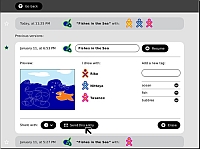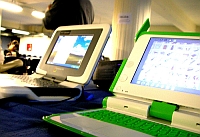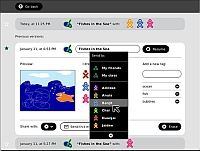Some of you might remember my critical comments on the OLPC XO's journal system when Christopher Blizzard talked about it at the NY Linux User's Group back in March. Now, after not hearing about the Journal for several weeks, Christopher Blizzard has posted an entry on his blog called "the journal for one laptop" which gives more details on how document storage (I don't even dare say "file storage" anymore) will work on the X0 machines.
After reading through this piece I completely forgot about my earlier doubts and I'm now convinced that the Journal is a very neat solution. The following paragraph explaining this mockup gives you a good overview of what the Journal will be capable of:
"Note the critical pieces that are included: the document itself, who you worked on it with, name and metadata in the form of tags and the ability to easily share it with other people. Also note that we're using "Resume" instead of open.Using Windows Explorer to look at the files on my laptop I now feel that there's lots of important information about my documents that I'm not seeing. And as anyone who's been working on collaborative projects at school, university or work can tell you it's a real nightmare to stay productive with all the overhead that's required to be able to work "together".The idea here being that you can actually restart an activity in the context of the people that you were originally working with on the document. So it's not just about about the "what" of the data but also the "who" and the "when" each of which is missing from our current desktop metaphors."
For example for a software-engineering project that we're currently working on at university we're relying on a CVS-repository, a mailing-list, normal e-mails, Skype, phones and face-to-face meetings in order to keep things running smoothly. Take any of those tools away from us and we'd be struggling. Collaboration is at the very heart of the One Laptop Per Child project.
Take the collaboration aspect away from it and you're just looking at a regular "Classmate PC". (Did I really say that out loud?) Seriously though, in order to get effective collaboration working over (mesh-)networks or even within schools you need much more than just applications or activities (OLPCspeak).
I think it was Office 2000 that first introduced some features aimed at making collaboration easier in homes and offices around the world. Now it's 2007 and most people I know (including myself) still write a Word 2007 document, e-mail it to their colleagues, wait for them to edit it and return the file before they work on it again. I have heard some good things about Google Docs and projects like Wikipedia are proof that online-collaboration does work.
But in general there's no denying that most people are still waiting for something that enables John and Jane Doe to easily collaborate with each other. As mentioned above a single application won't be enough to trigger that sort of development so we need to go down another layer and start looking at the operating system itself. It's important to realize that the whole software environment needs to be built with collaboration in mind.
What the OLPC's Document Journal basically promises to do is insert an intelligent layer between the user and the operating system and its files and directories. Instead of browsing through your files and directories 80's style you'll be looking at a much richer pool of information and tags for every document that you've created. Plus as the Journal is also time-stamped there's no need for a "most recently used" menu as all your documents will appear in the order that you've created them.
Another important aspect that I previously criticized is OLPC's FIFO (first-in, first-out) approach when it comes to deciding which data should remain on the X0's flash-memory. This might make sense from a technical point of view but from a user-perspective it's a real nightmare. Christopher Blizzard now writes that:
"The second problem is "what do you throw away?" When you're running out of space on your machine you often get a warning that says "hey, you should delete something." But what do you have that you can delete? The Journal makes it easy.This certainly sounds like a very good idea and is probably the best solution that's available at the moment. Combined with automatic backups and offline storage on the school servers (Blizzard also talks about those aspects in his blog-entry) this approach should enable children to be very flexible when it comes to deciding which documents they prefer to keep on their local X0s and which ones are stored on the other end of the mesh-network.You just delete old stuff that you haven't starred as important. (The question of whether or not that's done automatically is another question, but we're flexible enough to go either way.)"
In the end I can only agree with Blizzard when he says:
"[The journal] is the one part of OLPC and Sugar that needs the most amount of work and is the highest risk. But it's probably the most useful part of the entire user interface.".





Interesting. It seems to me that oplc is the first hardware and gui that were designed from the bottem up with collaboration in mind. I wonder if Sugar might be made into something that organizations would use, instead of Windows?
I don't think that Sugar itself will make it into homes and offices around the world, it's simply too targetted and customized at the specific environment for it to be useful in other places.
However having said that I do believe that certain technologies and concepts which are being created for Sugar right now (the Journal being the perfect example) will in one way or another also be integrated in many other applications, devices and solutions.
There is this software category called "groupware". Lotus Notes is a wellknown proprietary example. But there are also many open-source versions like Open-Xchange, OpenGroupware, Kolab, PHPgroupware, etc. None of them offers nearly that ease of use concerning collaboration.
So some of the principles used in sugar's journal and its mesh-networking might be applied there, too. Since most of the groupware is used in LANs based on groupware-servers rather than ad-hoc mesh networks some adaptation is necessary but seems possible.
I don't believe sugar might dominate office spaces any day, but as with anything revolutionary, their concepts and solutions will inspire many simple non disruptive features in future software and hardware.
I loved all the concepts, but I am already sick from all the round corners, there is a big difference between "white space" and "wasted space". I feel like some better spacing and typesetting could really revamp that interface.
Side Issue:
The Times of India did it again:
********************************
According to their article in the issue of May 9 India started a project of a $10 laptop. Although the current price estimation is at $47 it is expected to go down using economies of large numbers. No specifications have been published to protect the IP of its designers. (Obviously it is going to be a proprietary design.) The deployment of these laptops is not expected before 2 years from now.
http://timesofindia.indiatimes.com/TOIonline/India/HRD_hopes_to_make_10_laptops_a_reality/articleshow/1999849.cms
Practically the same article was published in the same paper on Sept 26 2006 http://timesofindia.indiatimes.com/articleshow/2019126.cms
I could really see many of Sugar's and the XO's features taking off in the corporate world: chief among them the mesh networking and avahi presence services that run on top of it. The journal would also be awesome for so many corporate apps.
Roland,
The $10 laptop is very old news. OLPC News dismissed it as empty political grandstanding back in September: http://www.olpcnews.com/countries/india/india_olpc_laptop_10.html
I love this idea. I wish I could find every activity in chronological order. Google Desktop does this for some programs, but OLPC Journal looks way better.
When can I have this on my own computer?